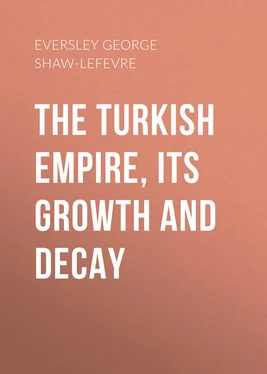George Eversley - The Turkish Empire, its Growth and Decay
Здесь есть возможность читать онлайн «George Eversley - The Turkish Empire, its Growth and Decay» — ознакомительный отрывок электронной книги совершенно бесплатно, а после прочтения отрывка купить полную версию. В некоторых случаях можно слушать аудио, скачать через торрент в формате fb2 и присутствует краткое содержание. Жанр: foreign_antique, foreign_prose, на английском языке. Описание произведения, (предисловие) а так же отзывы посетителей доступны на портале библиотеки ЛибКат.
- Название:The Turkish Empire, its Growth and Decay
- Автор:
- Жанр:
- Год:неизвестен
- ISBN:нет данных
- Рейтинг книги:3 / 5. Голосов: 1
-
Избранное:Добавить в избранное
- Отзывы:
-
Ваша оценка:
- 60
- 1
- 2
- 3
- 4
- 5
The Turkish Empire, its Growth and Decay: краткое содержание, описание и аннотация
Предлагаем к чтению аннотацию, описание, краткое содержание или предисловие (зависит от того, что написал сам автор книги «The Turkish Empire, its Growth and Decay»). Если вы не нашли необходимую информацию о книге — напишите в комментариях, мы постараемся отыскать её.
The Turkish Empire, its Growth and Decay — читать онлайн ознакомительный отрывок
Ниже представлен текст книги, разбитый по страницам. Система сохранения места последней прочитанной страницы, позволяет с удобством читать онлайн бесплатно книгу «The Turkish Empire, its Growth and Decay», без необходимости каждый раз заново искать на чём Вы остановились. Поставьте закладку, и сможете в любой момент перейти на страницу, на которой закончили чтение.
Интервал:
Закладка:
Mahomet died of apoplexy in 1421 at the early age of forty-seven. He was buried at Brusa in a mausoleum near to the splendid building known as the Green Mosque, which he had himself erected.
VI
MURAD II
1421-51
Murad succeeded his father in the Sultanate as second of the name. He reigned for thirty years, including two short periods when he abdicated and retired into private life. But on each occasion he was compelled by the exigencies of the State, and the youth and inexperience of his son and successor, to resume the throne. He much resembled his father in vigour and capacity as a general and in his desire to act justly.
At the very commencement of Murad’s reign the Greek Emperor Manuel, by an almost incredible act of folly, hoping to take advantage of Murad’s youth and inexperience, let loose from confinement a man who claimed, whether rightly or not was never clearly established, to be Mustapha, the son of Sultan Bayezid, who had disappeared after the battle of Angora. Manuel entered into a treaty with this claimant to the Ottoman throne, by which, in the event of his succeeding in establishing his succession, the city of Gallipoli and all the cities on the shores of the Black Sea, taken from the Greek Empire by the Turks, were to be restored to it.
In spite of this scandalous treachery to Islam, the so-called Mustapha succeeded in raising a large army in Europe, with which he defeated the troops who adhered to Murad. He then crossed the Dardanelles into Asia with his army in vessels supplied by the Emperor Manuel. Murad showed all the vigour and capacity of his race in dealing with this emergency. He won over the greater part of Mustapha’s army, who were disaffected. He defeated what remained. Mustapha was driven across the Straits again to Gallipoli, where he was besieged, captured, and hanged, as the best proof, it was said, that he was an impostor.
Murad, having defeated this claimant to his throne, determined to avenge the perfidy of the Emperor Manuel and to put an end to the Greek Empire by the capture of Constantinople. For this purpose he collected an army of veterans. He invested the city, making a long line of great earthworks from the Golden Horn to the Sea of Marmora. From this he bombarded the city walls by cannon, then for the first time used by the Ottoman army, but which were not as yet very effective. He also used movable towers, from which assaults could be made on the walls of the city. He proclaimed that the great wealth of the capital would be the prize of the soldiers if the assault on it were successful. He made a special promise to a band of five hundred Dervishes, who were to lead the assault, that all the nuns in the city would be given to them as concubines. In spite of these great inducements to victory, the assault was unsuccessful. The Greeks defended the walls of the city with the utmost heroism, assisted, it was said, by a timely apparition of the Holy Virgin, which stimulated their efforts and depressed the assailants. Murad would probably have been successful with the overwhelming forces at his disposal if he had persisted in the siege, but he was compelled to raise it by a diversion cleverly contrived by the Greek Emperor.
A rival to the Sultan was set up in Asia in another Mustapha, a younger brother of Murad, who had not been put to death in pursuance of the fratricidal policy of his family. This new claimant was supported by the Karamanians and Kermians, and with their aid he defeated an Ottoman army in Asia Minor. Murad found it necessary to abandon the siege of Constantinople, and to transfer his main army to Asia Minor for the purpose of dealing with this danger to his throne. He came to close quarters as quickly as possible with Mustapha’s army, and defeated it. Mustapha was taken prisoner and was hanged at once by his captors, without giving an opportunity to Murad to exercise his clemency in favour of his brother, had he so willed it. Murad then occupied himself by reducing the Karamanian and other Emirs to complete subjection to his Empire.
Meanwhile the Emperor Manuel died, and was succeeded by John Palæologus. Murad, in lieu of renewing the siege of Constantinople, was content to make another treaty with the new Emperor, imposing on him a heavy tribute and stripping him of almost every possession beyond the walls of his capital. The Empire thus obtained a reprieve for a few brief years.
In the case of Salonika, which had been recently sold by the Greek Emperor to the Republic of Venice, now desirous of effecting a lodgment in Macedonia, Murad refused to recognize the right of the Emperor to transfer to a foreign Power a city which at one time had been under Ottoman rule. It had three times in the last hundred years been captured by the Ottomans, and had as often been recaptured by the Greeks. Murad led an army, in 1430, to attack it, and, after a vigorous resistance by the Venetians, captured it by assault, and finally annexed the city and its district to the Turkish Empire. It was thought that Murad showed great clemency in not allowing his soldiers to indulge in a wholesale massacre. The Greek inhabitants, however, were sold into slavery, and their numbers were so great that a good-looking girl was sold for the price of a pair of boots.
The suppression of rebellion in Asia Minor, the subjection of the Greek Emperor to the position of a humble vassal, and the capture of Salonika had occupied Murad for some years. Later he was involved in long struggles with his neighbours, the Hungarians, on the northern boundaries of his Empire. The Ottomans were engaged in constant raids across the Danube, where vast districts were devastated, and thousands of their population were carried off as captives for sale as slaves. There arose about this time in Hungary a national hero, the celebrated Hunyadi, a natural son of the late King Sigismund. He was a born leader of men, not a great general, but a most valiant fighter. He had gained great distinction in war in other directions. He now became the soul of hostility against the Ottomans. He was known as the White Knight, on account of his silver armour, which always shone in the van of the impetuous charges of his cavalry. He was rightly regarded by his countrymen as a patriot and a national hero. None the less, he was a bloodthirsty ruffian. He made a practice of massacring all the prisoners taken in battle. He found pleasure in having this effected, in his presence, at banquets, where the guests were entertained by the shrieks of the dying men.
Hunyadi for twenty years was a terror to the Ottoman armies. His first encounter with them was at Hermannstadt, north of the Danube, which was invested by an army of eighty thousand Ottomans. He led an army of twenty thousand Hungarians against them, in relief of the fortress, and inflicted a severe defeat on them, in despite of great disparity of numbers. Twenty thousand of the Ottomans were killed, including the general. The others were dispersed. Murad sent another army of eighty thousand men against him, under another Pasha. Hunyadi again defeated it with great slaughter at Varsag.
These notable victories roused great enthusiasm in Europe. It was determined to take the offensive against the Ottomans, and to make another effort to drive them out of Europe. A coalition was formed for the purpose between Hungary and Poland, then united under King Ladislaus, and Wallachia and Bosnia. Serbia, which under its king, Stephen Lazariwitch, had been the firm ally of the Ottomans, and had supported them in many campaigns in Asia and Europe, was now induced to abandon this alliance and, under Stephen’s successor, George Brancowitch, to join the confederacy against the Ottomans. The Pope, Eugenius, was most active in support of this combination. His legate, Cardinal Julian Cesarini, led an armed force in support of it. Money was raised for the purpose of the war by a great sale of indulgences to the faithful in every part of Europe. A large contingent of French and German knights joined the allied army. It was, in fact, another crusade, prompted by religious zeal on behalf of Christianity against Islam. The allied army was under the nominal command of Ladislaus, but Hunyadi was its real leader.
Читать дальшеИнтервал:
Закладка:
Похожие книги на «The Turkish Empire, its Growth and Decay»
Представляем Вашему вниманию похожие книги на «The Turkish Empire, its Growth and Decay» списком для выбора. Мы отобрали схожую по названию и смыслу литературу в надежде предоставить читателям больше вариантов отыскать новые, интересные, ещё непрочитанные произведения.
Обсуждение, отзывы о книге «The Turkish Empire, its Growth and Decay» и просто собственные мнения читателей. Оставьте ваши комментарии, напишите, что Вы думаете о произведении, его смысле или главных героях. Укажите что конкретно понравилось, а что нет, и почему Вы так считаете.












